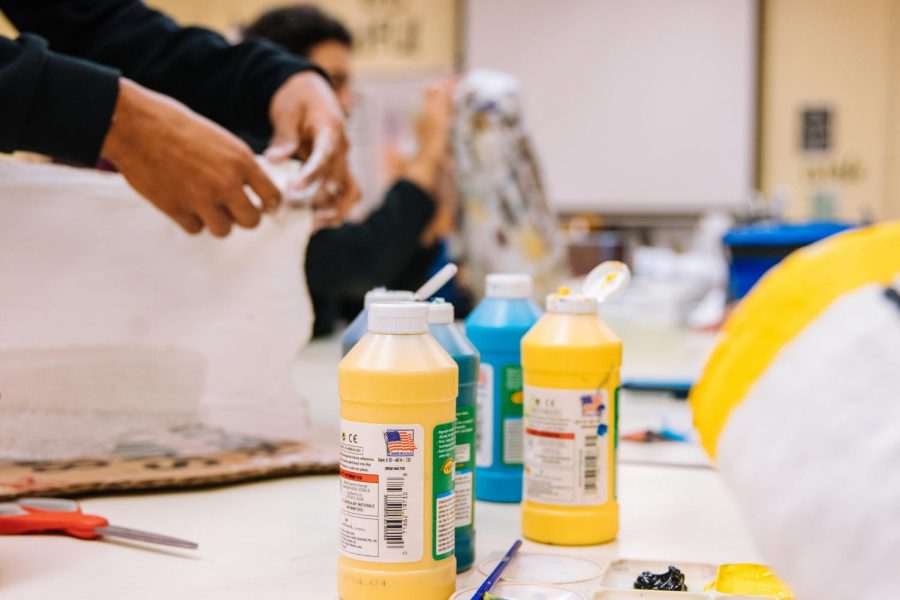Student Learning Outside of the Academic Field
December 16, 2020
Ever since the pandemic began in 2020, our world has been continuously changing. Shops have closed down, restrictions have been set in place worldwide, and schools have moved to virtual learning. Quarantine, however, has given multiple students numerous opportunities to learn something away from the academic essentials that school provides. Extracurriculars, for instance, allow students to encourage their creativity and learn new skills that they may not have been able to foster before the pandemic. Books, movies, and other forms of media can open up a new world of imagination for kids and inspire them to create something of their own. Even simple things such as Legos or jigsaw puzzles could teach people something. Learning doesn’t have to be restricted to the lessons from schools; in fact, the best place in learning is often within the real world. In these hard times, kids are learning skills that prepare them for the real world just as much as academic learning would, if not more.
Extracurriculars: A Sense of Normalcy and Connection During Hard Times
Extracurriculars can allow people to learn a new skill that academic learning doesn’t provide as well as supply a sense of normalcy in the midst of a wacky year. School clubs, for example, allowed students time to socially interact with each other and take their minds off of academics for a bit, just like in pre-Covid schooling. An article entitled “Extracurriculars Play a Vital Role During the Pandemic” states that school clubs “have provided a sense of connection and normalcy during a time when many feel isolated and stressed”. Here, students are free to talk and interact with each other as they learn how to bake a cake, draw a tree, or even build a house out of Popsicle sticks. Sports teams, orchestras, theatre troupes, choirs, and other out-of-school groups also hold value in learning as kids pick up a new skill set every day, whether it’s throwing and catching a football or learning to play the violin. Extracurriculars have something for everyone to learn from, and it serves as a distraction from the stress that school may bring.
Media: How It Serves As Inspiration To Young Artists
Books, movies, TV shows, and other media forms can serve as an influence on students as well, and because of the pandemic, we’ve been left with more time for such pieces of art. Books have been called one of the best ways to foster imagination, which encourages creativity and innovations. Movies such as The Shape of Water and Studio Ghibli films such as Spirited Away have been listed as movies to help artists find inspiration. TV shows like the morally philosophical (yet comedic!) The Good Place and the lighthearted, comforting Friends, or for younger audiences, the inclusive Sesame Street help shape and influence their viewers and learn how to be themselves within society. Music has been an inspiration to people for years, whether it was from the lyrics or the rhythm or other factors. Musicians have also allowed people to learn to love themselves and embrace who they are no matter what anyone else thinks. The media may not necessarily be teaching someone skills; instead, they inspire people to learn these skills on their own.
Legos, Jigsaw Puzzles, and other mini-projects
To some people, Legos and puzzles may seem time-consuming or a waste of time. But in a global pandemic, when most people are only going outside for the essentials (if at all), perhaps something to kill time wouldn’t be so bad. Legos and puzzles can also teach a lesson that’s more valuable than some may perceive: a lesson in staying focused. They aren’t something that can be built in five minutes. The larger the size, the longer it’ll take, but if you’re willing to focus on the task with minimal distractions, it won’t be long before you’ve finished. Puzzles and Legos don’t have to be the only options; other projects can help you to learn to stay focused while also teaching you something you might not have known about yourself. A senior in Washington D.C. demonstrated his knowledge of math, physics, and other areas of knowledge with a shed he had helped his father build as well as through a Black Lives Matter activism project. A couple of university students in Russia created a photography project on student perspectives during the quarantine. Whether it’s a simple jigsaw puzzle to kill time or a larger scale project such as a scrapbook, if you’re passionate about it and you know you’re going to stick to it, then the sky’s the limit.
Conclusion
Although none of the following may count for the educational system, in a time where the world has seemingly been flipped upside down and nothing seems to be going right, picking up a skill or learning something new during this quarantine could bring a sense of normalcy amongst the chaos. So take up something that you may not have before. Pick up an instrument that you’ve been putting off learning. Start writing in a journal. Maybe even learn a new language. These little things may not amount to your education, but mental health is important too, and if they help to bring any sense of rationality and keep you sane in times like these, then that’s just as good.












